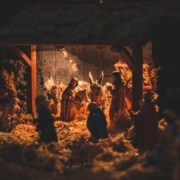We Are Not Forgotten
BY GRACE ADAMS | November 21, 2022
Sunday’s Readings
I have always remembered the statue outside of my church—called the Church of the Good Shepherd—growing up. The statue was of Jesus with a staff, holding a lamb around his shoulders while looking down at everyone who walked past. My preschool, connected to the parish, had programming centered on the imagery of Jesus as a loving shepherd, leading us to love, justice, and communion with one another. The story of the Good Shepherd gave 5-year-old me comfort in the idea that no matter how lost I become, I would never be forgotten and would always be called to return back to love. As a child learning about the Catholic faith, this imagery of God as a loving shepherd ingrained a deep sense of trust—that none of us are forgotten. 
I was reminded of this truth and imagery of God in yesterday’s gospel reading. Jesus reminds us that God is a God of the people who does not forget anyone, especially the oppressed, marginalized, and criminals. “Jesus, remember me when you come into your kingdom,” is what the criminal on Jesus’ side asks after Jesus has been crucified for us. The criminal is received with only love and familiarity as Jesus suffers alongside him. The God of familiarity and love is present throughout the Gospel in parables like that of the Good Shepherd, and in the moments of joy and sorrow throughout Jesus’ life, revealing that no one is forgotten by God.
We are called to be in communion with one another by not forgetting the other, as we are not forgotten by God, our Shepherd.
Grace Adams joined the ISN staff in 2022 as the coordinator for the Catholic Ethical Purchasing Alliance. She is an alumni of Le Moyne College and spent a year as an AmeriCorps VISTA at the Rochester food bank where she assisted in the development of several community health programs.









Jesus, “Remember me when you come into your kingdom.” Is a powerful statement of forgiveness that few can emulate.
How often in society and prisons is everyone forgiven, except those who were sex offenders, except mothers who have abused their children?
It is possible for everyone to change when offered loving compassion as Jesus did to those who were society’s outcasts.
When we offer love, dignity and respect to those who have been violent, we are treated with respect and no longer need to live in fear of violence.
When violence is all around us can we still remain in the centre of Jesus’ love, or is our fear transmitted to the children in our care in our homes and schools?
What would happen if teachers asked their children to sing and pray for those with guns outside, instead of hiding in fear under their desks for the whole school day?
The Good Shepherd remembers each and every member of the flock. Praise the Lord.